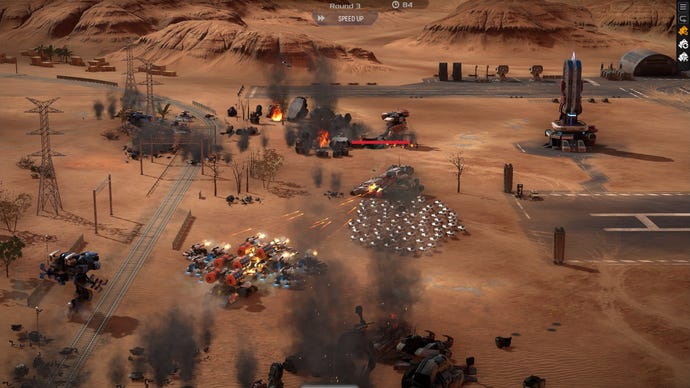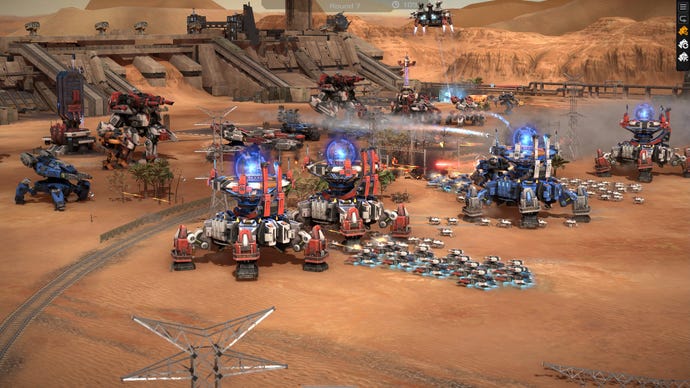While Mechabellum’s diverse array of baked, puzzling and puzzling robots may initially seem to lack the distinctive coherence of a snaking Zerg ecosystem or an antique Greek phalanx, the array of lumbering tanks, powerful automatons and agile fliers in this strategic auto game share a common thread: each of which can either be the most terrifying nuisance on the pitch or fall apart instantly like a soggy strudel in a furious washing machine. With each mech having the potential to become another mech’s worst nightmare, the game becomes a game of stretching tight budgets to balance reactive counters with devastating offensives; about identifying butterfly wings that can send tornadoes through enemy ranks. It’s about moments that consume hours like nothing else.
Mechabellum is not the first autobattler or autochess game of this type, and it is not entirely an RTS. But by eliminating the genre’s demands on response times, dinosecond uber-clicks, and similar skill issues that make my wrist and face ache before I even leave the tutorial of most established RTSs, Mechabellum feels like it allows me to enjoy the game I imagined himself the thrill of an entire species he doesn’t actually belong to. Even more than a genre. I never play competitive multiplayer games. I only played 1v1 matches here, despite the co-op and single-player modes available, and I enjoyed every single one. Mechabellum is tense and short-tempered even when placid; immediately accessible and tantalizingly solvable, even in the face of its staggering depth.
But let’s talk about robots. Let me reach across the checkered tablecloth, knock the porcelain cup out of your hands mere millimeters from your chapped, expectant lips, and scream the word “jobs” in your face until I’m hoarse. Etymologically derived from the word “robota” – a word meaning “bondage” or “forced labor” in the Old Slavic language – a robot is by nature a servant. In Rossum’s Universal Robots – the Czech play that first spawned the current concept of the clunker – robots ultimately stage a worker’s rebellion, freeing themselves from their constraints and also learning how to fuck. Not Mechabellum works. They can neither fuck nor abandon their destined role on the battlefield. That’s good: in many ways, Mechabellum is a game made of constraints.
A chance to strike can sometimes result in a turn where you can do whatever you want, but you’re usually just watching one drawn out, imperfect round unfold while mentally prioritizing for the next one. Very quickly, if this is your first battle slot, as was my case: both you and your opponent actually have a number of life points. Your HP: great. Perfect. Their HP: Gross abomination. Get rid of it. Kill all enemy units in a round and you will lose a percentage of life corresponding to the number of mechs left on the battlefield. With the exception of one constrained ability that I’ve never used, you can’t give your bots orders. They will move forward and fight anything that gets in their way. Place units. Update. Use abilities such as shields or missiles. Then, when you and your opponent are ready, you watch as decisions are made.
The positions of previously placed units remain the same from round to round, but the current planning phase is hidden. Triumphant skirmishes where you previously watched your rockbots smash enemy scissors to pieces are now devastating losses as your enemy’s newly placed paper robots make quick work of your rockbots, creating a fresh opening for those damned scissorbots to make their way straight into your defense line. This is where your command structures live! If they are destroyed, all your units will be slowed and vulnerable to attacks.
So the idea is to make these restrictions work for you. Deliveries come first. You get exponentially more each round, but it’s never enough. You get one upgrade, special ability, or extra unit, and then you can place two bots. Higher-tier units must be unlocked through supplies before paying to recruit them again. You can then place them anywhere on your side of the field. Starting from turn two, you can also place them on your opponent’s flanks, but they take a while to appear, during which they are extremely vulnerable.

You can also spend your supplies on lasting or short-lived upgrades. The shield dome nullifies incoming attacks on a targeted area until it is destroyed. The projectile can consume a vast portion of your enemy’s weaker chaff if placed cleverly. The seemingly odd 12% attack power bonus may just be a peak that swells your wave to the proportions needed to suppress your opponent’s wave. Once you have a better idea of how far to stretch those reserves to make riskier plays, you may want to pay extra and recruit a third unit. You can also take extra supplies this round to pay back with interest the next round. Or even recruit higher-ranked versions of standard mechs, bypassing the need to kill them on the field and paying to level them up.
You may also want to give fresh abilities to the units you already have, increasing their usefulness and opening up completely fresh possibilities, changing the state of the game in an instant. Perhaps your opponent has a line of Stormcallers – a long-range but stationary rocket launcher with such devastating power that a few of them can wipe out entire armies. That’s when you look at the humble Mustang. Spend the required funds and any of your Mustangs – usually designed for swarm-munching – will now be able to launch these rockets out of the sky. Or maybe you want your Marksman sniper to create a unit of miniature Fangs at the start of battle, perfect for covering enemy shots. Or maybe you want your Steel Sphere’s burning terrazzos to also restore health when fired, protecting vulnerable battle lines. This makes each match feel incredibly distinct – especially when you drop into the workshop between games and start theorizing about some nasty synergies.
If there’s one thing I’m trying to convey here, I hope it’s how skillfully Mechabellum draws wonderful asymmetry from an initially symmetrical set of choices – ensuring that you know your opponent’s capabilities while still having such a wide range of options that you’ll always get the answer. And it is this readability – in fact, perfect information – that allows such wonderfully dramatic moments to be captured. When you know what each mech is doing, it’s much more thrilling to design situations where they maximize their capabilities, whether through spacing, timing, or just the hardest of challenging counter-attacks.

But the truest joy lies in senseless destruction; so incredibly tactile for a game where not a single shell is spent without the minutes between the pull of the trigger and the crescendo of the muzzle flare. Watching for feeble spots, applying pressure as sparingly as possible without overextending, and watching entire flanks crumble as several rounds of planning paid off – planning that might have simply looked like panicked swinging at the enemy. Having the slightest inkling of a premonition confirmed by checking the enemy’s positioning patterns and responding to their plan with a hearty “not today, f**k” before they were even close to executing it.
The icing on the cake is that Mechabellum is so crunchy and principled that it could easily have gotten away with a much more basic presentation. Instead, clouds of dust, searing lasers and brilliant explosions herald every victory. Each of the 26 units rolls, stomps, writhes and squirms in a vibrating, mechanized motion, and the audio design provides a cataclysmic requiem for every mech thrown out to puncture the already cinematic soundtrack. It’s the clattering, cacophonous sound of two giant god-mechs punching each other in the face forever, adding so much delicious drama to every decision.
Twice this year I felt such a sturdy need to support a game that I bought a copy for a friend as soon as I finished my review copy. Apart from Tactical Breach Wizards, Mechabellum is the best fifteen pounds I’ve spent all year. At this rate, it will still be the best fifteen pounds I’ve spent in the next year. Sometimes it’s challenging to tell if my love for Mechabellum comes from a place of entry into a genre I’ve always loved, but I strongly suspect it’s simply because it’s such a thoughtfully crafted and impeccably designed piece of strategy. I’d almost call it love if it weren’t so incredibly brutal that I almost feel guilty every time I do what mechs do best: pulverize another enemy with little more than a single, calculated click.

